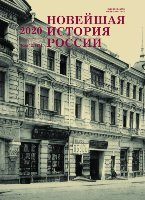Экономические предпосылки революционной ситуации 1917 года в России (по материалам публикаций англо-американских советологов)
Economic Preconditions of the Revolutionary Situation in Russia in 1917 (as seen by British and American Sovietologists)
Author(s): Iryna Viktorovna BoikoSubject(s): National Economy, Agriculture, Economic history, Labor relations, Economic policy, International relations/trade, Rural and urban sociology, Economic development, Pre-WW I & WW I (1900 -1919), Socio-Economic Research, Transport / Logistics
Published by: Издательство Исторического факультета СПбГУ
Keywords: agrarian economy; foreign trade; foreign investments; industrialization; productivity of labor; Trans-Siberian Railroad;
Summary/Abstract: At the beginning of the 20th century, substantial economic problems accumulating in Russian society brought the country to profound political transformations. Industrialization began at the turn of the century and required substantial financial resources from expanded grain exports, an important export for foreign markets. However, low labor productivity in the Russian agricultural sector, along with unsuccessful reforms and a drastically diminished rural population due to urban migration, temporary harvest failures, and high taxes, squeezed the life of agrarians. Consequently, the food supply in the national economy and foreign markets encountered a harsh challenge. Despite the urgent need to modernize agricultural production, the main aim of Russian industrialization embraced coal production, metallurgy, and transportation, especially railroad construction. Significant dependence on foreign supplies of equipment and tools reduced the rate of Russian economic independence and became one main constraint on economic modernization. Another problem was substantial state financial support for developing industrial and transportation systems, with the construction of the Trans-Siberian Railroad as one of the most financially consuming, contributing to the state budget deficit and corruption. The First World War revealed substantial economic distortions, especially enormous dependence on foreign aid and low productivity. Rapidly spreading economic chaos brought the country to profound political transformations.
Journal: Новейшая история России
- Issue Year: 10/2020
- Issue No: 1
- Page Range: 8-19
- Page Count: 12
- Language: Russian

